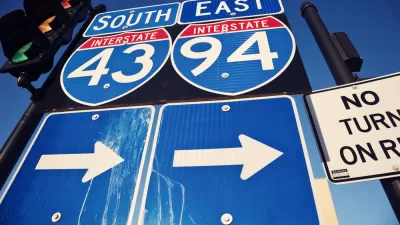A federal court has ruled that a proposed highway expansion said to be the largest single transportation project in Wisconsin history must consider regional impacts (on sprawl and transit-dependent populations) in its environmental analysis.
"It is just an interim ruling, but it is potentially an important one: In a suit brought by inner-city, minority plaintiffs, the US District Court in Milwaukee has indicated that the Federal Highway Administration (FHWA) and Wisconsin Department of Transportation (WisDOT) cannot enlarge a major urban freeway connection without further study of the project's impacts on transit-dependent populations and on regional suburban sprawl," reports Kaid Benfield. "For now, the case is headed to mediation; but the court's ruling on legal issues in the case, as articulated in an opinion signed by federal judge Lynn Adelman, is potentially significant to other highway-expansion controversies with similar circumstances."
"The court rejected the agencies’ argument that they need only study the impacts in the specific area where the highway expansion was taking place, finding that it would defeat the “action-forcing” intent of the National Environmental Policy Act (NEPA) if a piecemeal approach to highway projects and analysis allowed cumulative regional impacts to escape scrutiny."
FULL STORY: Federal court says highway sponsors must first study transit, impacts on suburban sprawl

Maui's Vacation Rental Debate Turns Ugly
Verbal attacks, misinformation campaigns and fistfights plague a high-stakes debate to convert thousands of vacation rentals into long-term housing.

Planetizen Federal Action Tracker
A weekly monitor of how Trump’s orders and actions are impacting planners and planning in America.

San Francisco Suspends Traffic Calming Amidst Record Deaths
Citing “a challenging fiscal landscape,” the city will cease the program on the heels of 42 traffic deaths, including 24 pedestrians.

Defunct Pittsburgh Power Plant to Become Residential Tower
A decommissioned steam heat plant will be redeveloped into almost 100 affordable housing units.

Trump Prompts Restructuring of Transportation Research Board in “Unprecedented Overreach”
The TRB has eliminated more than half of its committees including those focused on climate, equity, and cities.

Amtrak Rolls Out New Orleans to Alabama “Mardi Gras” Train
The new service will operate morning and evening departures between Mobile and New Orleans.
Urban Design for Planners 1: Software Tools
This six-course series explores essential urban design concepts using open source software and equips planners with the tools they need to participate fully in the urban design process.
Planning for Universal Design
Learn the tools for implementing Universal Design in planning regulations.
Heyer Gruel & Associates PA
JM Goldson LLC
Custer County Colorado
City of Camden Redevelopment Agency
City of Astoria
Transportation Research & Education Center (TREC) at Portland State University
Jefferson Parish Government
Camden Redevelopment Agency
City of Claremont





























